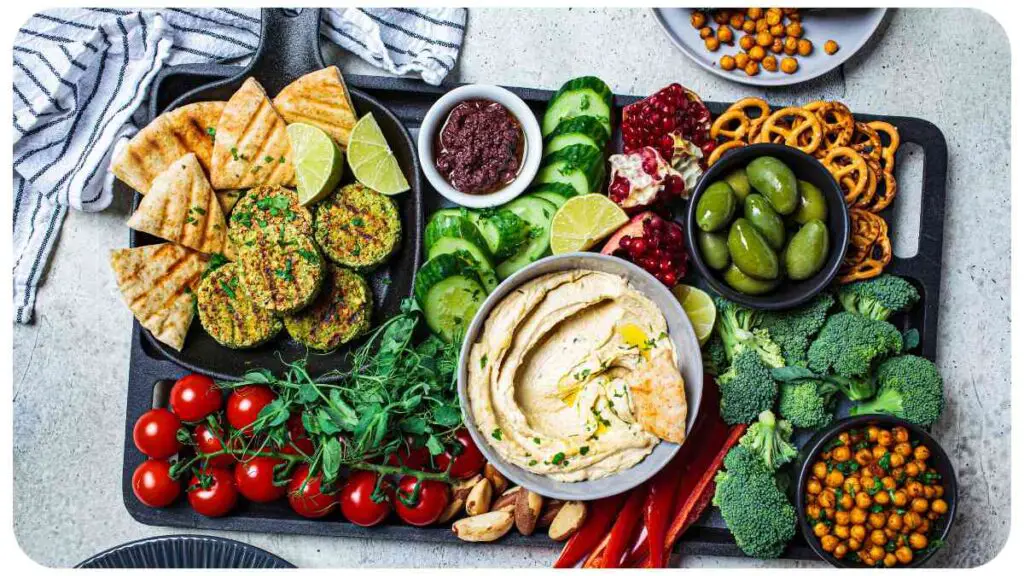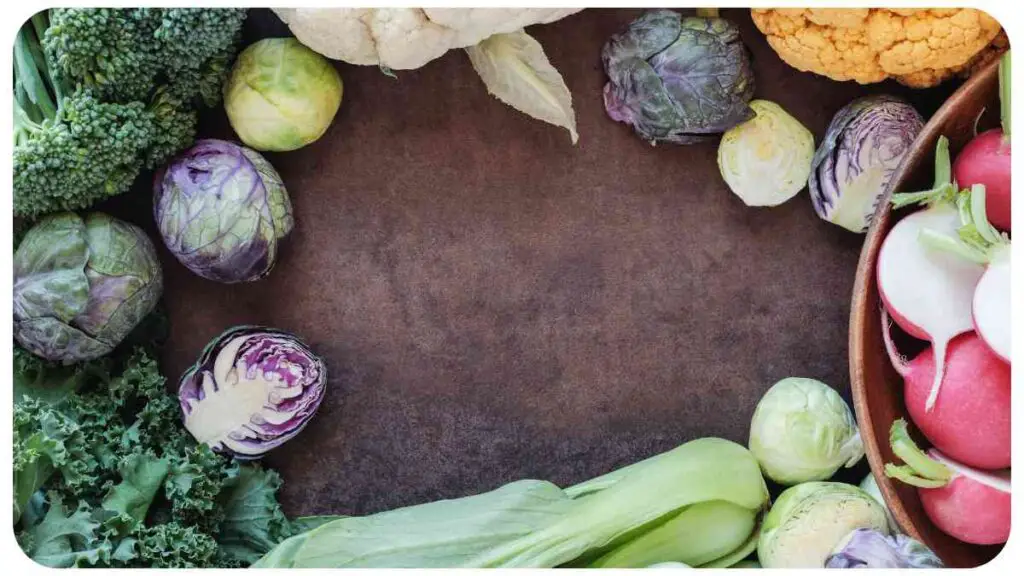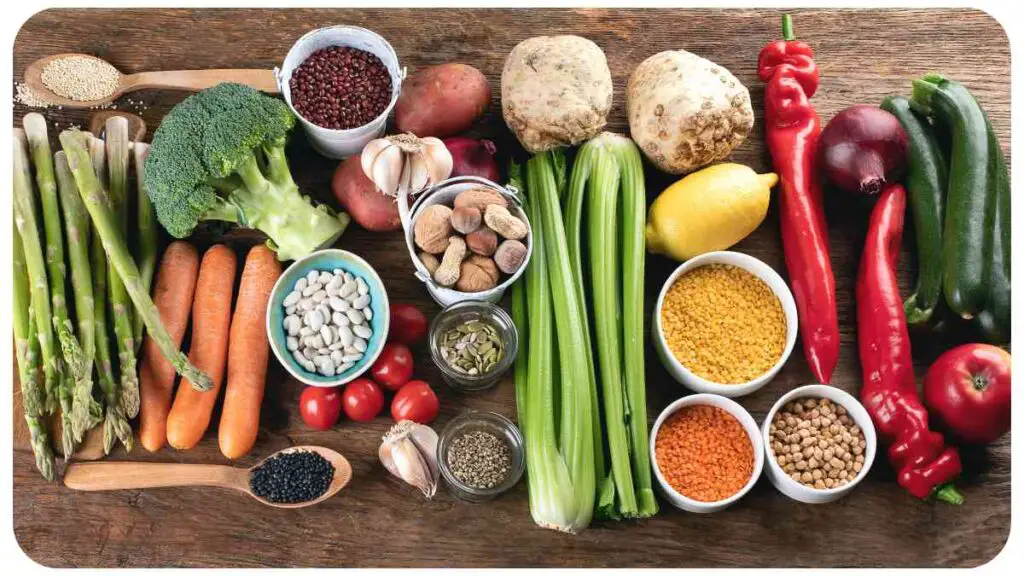As the popularity of veganism continues to grow, so do myths and misconceptions around this dietary lifestyle. This article aims to debunk common myths about veganism and provide accurate information to help you make an informed decision.
Whether you are considering transitioning to a vegan diet or simply curious about the topic, read on to separate fact from fiction.
| Takeaways |
|---|
| Vegan diets can provide all necessary nutrients |
| Vegan diets can be affordable and accessible |
| Vegan diets offer a wide variety of flavorful options |
| Plant-based foods can be delicious and satisfying |
| Veganism is a sustainable lifestyle choice |
| Veganism is not just a passing trend |
| Proper planning and knowledge are key to a successful vegan diet |
| Vegan diets can support athletic performance |
| There are resources available to debunk myths about veganism |
Overview of Veganism
Veganism is more than just a diet; it’s a compassionate lifestyle choice. Vegans avoid consuming any animal products, including meat, poultry, fish, dairy, eggs, honey, and other animal-derived ingredients. Instead, they rely on a plant-based diet that consists of fruits, vegetables, legumes, whole grains, nuts, and seeds.
Understanding the environmental impact of a vegan diet is crucial for making informed choices. According to a study mentioned in The Environmental Impact of a Vegan Diet: You’ll Be Shocked, adopting a vegan lifestyle significantly reduces carbon emissions and helps conserve water resources.
TABLE 1: Vegan Food Alternatives
| Animal Products | Vegan Alternatives |
| Meat (Beef, Chicken, Pork) | Plant-based proteins |
| Dairy (Milk, Cheese) | Nut milks, Vegan cheeses |
| Eggs | Tofu, Plant-based egg substitutes |
| Honey | Agave nectar, Maple syrup |
Myth 1: Vegan Diets Lack Protein

Contrary to popular belief, vegan diets can provide all the necessary protein for optimal health. Plant-based sources such as legumes (beans, lentils, chickpeas), tofu, tempeh, seitan, nuts, and seeds are excellent protein sources.
Additionally, incorporating whole grains and pseudo-grains like quinoa and amaranth can further boost protein intake. By combining these protein-rich foods, vegans can easily meet their daily protein requirements.
Science provides compelling evidence for the numerous health benefits of a vegan diet. As stated in The Health Benefits of a Vegan Diet: The Science Behind It All, research shows that plant-based eating supports heart health, reduces the risk of chronic diseases, and promotes overall well-being.
TABLE 2: High-Protein Vegan Foods
| Food | Protein Content (per 100g) |
| Lentils | 9g |
| Chickpeas | 19g |
| Tofu | 15g |
| Almonds | 21g |
| Quinoa | 14g |
Myth 2: Vegan Diets Are Nutritionally Incomplete
Another common misconception is that vegan diets lack essential nutrients. While it’s true that certain nutrients are more abundant in animal products, a well-planned vegan diet can provide all the necessary nutrients for a healthy lifestyle.
Plant-based foods are rich in vitamins, minerals, fiber, and antioxidants. They can effectively meet our nutritional needs when consumed in a balanced manner. However, it’s important to pay attention to a few key nutrients that may require special attention:
Discover the mind-blowing reasons to embrace veganism today! 10 Mind-Blowing Reasons to Go Vegan Today highlights the ethical, environmental, and health motivations behind this lifestyle choice, empowering individuals to make a positive impact
TABLE 3: Key Nutrients in a Vegan Diet
| Nutrient | Sources |
| Vitamin B12 | Nutritional yeast, fortified foods, supplements |
| Omega-3 fatty acids | Chia seeds, flax seeds, walnuts, hemp seeds, algae-based supplements |
| Iron | Legumes, dark leafy greens, fortified cereals |
| Calcium | Fortified plant milks, tofu, kale, almonds |
| Vitamin D | Sun exposure, fortified plant milks, supplements |
Myth 3: Vegan Diets Are Expensive
Contrary to popular belief, vegan diets can be affordable and budget-friendly. While some vegan specialty products or exotic ingredients may be pricier, most plant-based staples are actually quite affordable. Fruits, vegetables, legumes, and grains are often cheaper than animal products, making vegan meals accessible to people with various budgets.
By prioritizing whole foods and shopping in-season, you can further reduce costs. Planning meals, buying in bulk, and cooking from scratch are effective strategies for optimizing your grocery budget while following a vegan lifestyle.
TABLE 4: Affordable Vegan Staples
| Food | Approximate Cost |
| Lentils | $0.50 per pound |
| Rice | $1 per pound |
| Oats | $0.50 per pound |
| Canned Beans | $1 per can |
| Frozen Vegetables | $2 per bag |
Myth 4: Vegan Diets Lack Variety
The notion that vegan diets are monotonous couldn’t be further from the truth. Plant-based eating opens up a world of culinary exploration with a wide range of fruits, vegetables, grains, legumes, herbs, and spices. By experimenting with different recipes, cuisines, and cooking techniques, you can enjoy a diverse and exciting array of flavors, textures, and aromas.
TABLE 5: Diverse Vegan Ingredients
| Ingredient | Culinary Uses |
| Coconut Milk | Creamy curries, smoothies, desserts |
| Avocado | Guacamole, sandwiches, salads |
| Quinoa | Grain bowls, salads, stuffed peppers |
| Chickpeas | Hummus, falafel, curries |
| Turmeric | Golden milk, curries, roasted vegetables |
Myth 5: Plant-Based Foods Are Bland
Contrary to popular belief, plant-based foods can be incredibly flavorful and delicious. With the right combination of herbs, spices, and seasonings, vegan dishes can be bursting with taste. In fact, removing animal products from your diet allows you to explore a wider variety of flavors and create vibrant, satisfying meals.
By incorporating ingredients like garlic, onions, ginger, turmeric, cumin, coriander, chili peppers, and fresh herbs, you can elevate the taste of plant-based dishes. Experimenting with different cooking techniques and exploring international cuisines can also add excitement and depth to your meals.
Living a sustainable vegan lifestyle is essential for preserving our planet. The Ultimate Guide to Living a Sustainable Vegan Lifestyle provides practical tips, from reducing waste to supporting ethical fashion, enabling individuals to contribute to a more eco-conscious world
TABLE 6: Flavorsome Vegan Seasonings
| Seasoning | Flavor Profile |
| Smoked Paprika | Rich, smoky, slightly sweet |
| Tamari/Soy Sauce | Savory, umami |
| Nutritional Yeast | Cheesy, nutty, umami |
| Harissa | Spicy, tangy, smoky |
| Garam Masala | Warm, aromatic, slightly sweet |
Myth 6: Vegan Diets Are Difficult to Follow
Transitioning to a vegan lifestyle may seem overwhelming at first, but with the right knowledge and resources, it can be an enjoyable and sustainable choice. Incorporating veganism into your routine becomes easier with time, as you discover new recipes, learn about plant-based substitutes, and find supportive communities.
Exploring vegan blogs, cookbooks, and online forums can provide valuable information and support. Additionally, seeking guidance from a registered dietitian or nutritionist can help ensure you meet your nutritional needs while following a vegan diet.
TABLE 7: Vegan Kitchen Essentials
| Item | Purpose |
| High-Speed Blender | Smoothies, sauces, nut butters, creamy soups |
| Food Processor | Chopping vegetables, making energy balls, hummus |
| Cast Iron Skillet | Searing vegetables, cooking tofu, baking cornbread |
| Vegetable Spiralizer | Creating zucchini noodles, sweet potato curly fries |
| Instant Pot | Cooking beans, grains, soups, stews in a fraction of time |
Myth 7: Vegan Diets Are Low in Iron
Iron is an essential mineral that plays a crucial role in transporting oxygen throughout the body. While it is true that plant-based sources of iron are not as readily absorbed as iron from animal products, vegans can still meet their iron needs through proper food choices and combination.
Plant-based sources of iron, such as legumes, tofu, tempeh, spinach, and fortified cereals, can provide an adequate amount of iron when consumed alongside Vitamin C-rich foods. Vitamin C enhances iron absorption, so pairing iron-rich foods with citrus fruits, tomatoes, or bell peppers can optimize iron absorption in the body.
TABLE 8: Iron-Rich Vegan Foods
| Food | Iron Content (per 100g) |
| Lentils | 3.3mg |
| Spinach | 2.7mg |
| Tofu | 5.4mg |
| Fortified Cereal | Varies, check labels |
| Pumpkin Seeds | 4.2mg |
Myth 8: Vegan Diets Are Deficient in Calcium

Calcium is a vital nutrient for strong bones and teeth, but it doesn’t exclusively come from dairy products. Plant-based sources also offer plenty of calcium-rich options. Dark leafy greens like kale and collard greens, fortified plant milks, tofu made with calcium sulfate, almonds, and sesame seeds are excellent sources of calcium.
The key to maintaining sufficient calcium levels on a vegan diet is to ensure an intake of these calcium-rich foods. Supplementing with calcium if necessary, especially for those with higher calcium requirements, can be an effective strategy to meet your daily needs.
Dining out as a vegan can be enjoyable with the right knowledge and strategies. In The Ultimate Guide to Dining Out as a Vegan: Tips and Tricks, you’ll find useful insights and recommendation on how to navigate menus, communicate with restaurant staff, and create satisfying plant-based meals while dining out.
TABLE 9: Calcium-Rich Vegan Foods
| Food | Calcium Content (per 100g) |
| Kale | 150mg |
| Almonds | 264mg |
| Fortified Plant Milk | Varies, check labels |
| Tofu (Calcium-set) | 350mg |
| Chia Seeds | 631mg |
Myth 9: Vegans Are More Prone to Vitamin B12 Deficiency
Vitamin B12 is primarily found in animal-derived products, making it a concern for vegans. However, with proper planning, it is possible for vegans to obtain adequate levels of this essential vitamin. Vitamin B12 can be obtained through fortified foods, such as plant-based milks, breakfast cereals, nutritional yeast, and vegan meat substitutes.
Additionally, taking a B12 supplement is recommended for vegans to ensure they meet their daily needs. Regularly monitoring B12 levels through blood tests and consulting with a healthcare professional can help maintain optimal vitamin B12 levels.
TABLE 10: Vegan Sources of Vitamin B12
| Food | Approximate B12 Content |
| Nutritional Yeast | Varies, check labels |
| Fortified Plant Milk | Varies, check labels |
| Vegan Meat Substitutes | Varies, check labels |
| B12 Supplements | Varies, follow guidelines |
Myth 10: Vegan Diets Are Unsuitable for Athletes
Contrary to the belief that vegan diets cannot support athletic performance, many successful athletes thrive on plant-based diets. Properly planned vegan diets can provide sufficient energy, protein, carbohydrates, and nutrients for optimal athletic performance and recovery.
Plant-based protein sources like beans, lentils, tofu, and tempeh can meet the increased protein needs of athletes. Carbohydrates from whole grains, fruits, and vegetables provide valuable energy for workouts. It’s essential for athletes to focus on a well-rounded, adequately planned vegan diet to meet their specific nutritional requirements.
TABLE 11: Plant-Based Protein for Athletes
| Protein Source | Protein Content (per 100g) |
| Hemp Seeds | 31g |
| Chickpeas | 19g |
| Seitan | 25g |
| Quinoa | 14g |
| Peanut Butter | 25g |
Myth 11: Veganism Is a Trend
While the popularity of veganism has increased in recent years, it is more than just a passing trend. Veganism is rooted in ethical, environmental, and health concerns. People choose this lifestyle for various reasons, including animal welfare, reducing their carbon footprint, and improving personal well-being.
Veganism has a rich history and has been practiced for centuries by individuals and communities around the world. As awareness grows about the impacts of animal agriculture on the environment and animal welfare, veganism continues to gain recognition and adoption.
Myth 12: Vegan Diets Are Only for the Environmentally Conscious

While veganism aligns with environmental sustainability, it is not limited to those who are solely environmentally conscious. People choose veganism for a variety of reasons, including health, animal welfare, and ethical considerations. The benefits of a vegan lifestyle extend beyond reducing environmental impact.
Vegan diets have been associated with lower rates of chronic diseases, such as heart disease, type 2 diabetes, and certain types of cancer. Additionally, the avoidance of animal exploitation and cruelty is a driving factor for many vegans, highlighting the ethical aspect of this lifestyle.
Conclusion
By debunking these common myths about veganism, we can dispel misconceptions and provide accurate information about this dietary choice.
Vegan diets can provide all the necessary nutrients for a healthy life, and they can be diverse, delicious, and accessible to individuals with varied budgets and preferences. Whether you choose veganism for health, ethical, or environmental reasons, it is a viable and sustainable lifestyle option.
Further Reading
Here are some helpful resources to learn more about debunking myths about veganism:
Breaking 5 Myths About Being Vegan: This article addresses common misconceptions about veganism, providing insights into the nutritional aspects and debunking myths surrounding a plant-based diet.
13 Myths About Veganism That Just Aren’t True: This comprehensive article debunks 13 widespread myths about veganism, covering topics such as nutrition, cost, health, and ethics.
Vegan Myths and Facts: Explore this resource to find a detailed breakdown of common vegan myths and corresponding factual information, providing clarity on misconceptions related to vegan diets and lifestyles.
FAQs
Is it difficult to get all the necessary nutrients on a vegan diet?
No, a well-planned vegan diet can provide all essential nutrients. By incorporating a variety of plant-based foods, supplementing when necessary, and paying attention to certain nutrients like B12 and iron, nutritional needs can be met.
Are vegan diets suitable for children and teenagers?
Yes, when properly planned, vegan diets can be nutritionally adequate for individuals of all ages, including children and teenagers. It’s important to ensure they receive a balanced intake of nutrients, including sources of calcium, Vitamin D, and iron.
Can vegans consume enough protein?
Yes, plant-based sources like legumes, tofu, tempeh, seitan, and quinoa provide ample protein. By consuming a diverse range of plant foods and meeting daily protein needs, vegans can easily meet their protein requirements.
Do vegans need to take supplements?
While it is possible to obtain most nutrients from a well-planned vegan diet, some nutrients may require special attention. Vitamin B12 supplementation is typically recommended for vegans, and other supplements like Vitamin D or omega-3 fatty acids may be necessary depending on individual needs.
Can a vegan diet support athletic performance?
Yes, vegan diets can adequately support athletic performance. By planning meals to include sufficient protein, carbohydrates, and other essential nutrients, athletes can thrive on a plant-based diet. Proper meal timing and ensuring adequate calorie intake are also important factors for athletes to consider.

Hi! My name is Hellen James, and I’m a vegan lifestyle enthusiast. I’ve been living the vegan lifestyle for over 10 years now, and it’s been one of the best decisions I’ve ever made. The food is amazing, the community is incredible, and there’s no way I could go back after experiencing all this firsthand.


